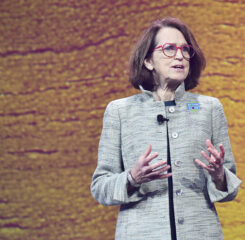CAST Case Study: Skilled Nursing Residents Adopt the Birdsong Tablet
To give its residents the positive benefits of using a special touchscreen digital tablet for social engagement, LeadingAge CAST Patron Westminster-Canterbury on Chesapeake Bay partnered with TMM Software to create a custom tablet at an affordable cost. Thanks to local youth volunteers who helped train residents, the tablet achieved just above a 92% acceptance rate. A new CAST case study charts the tablet’s success.
Challenge
Westminster-Canterbury is a life plan community in Virginia Beach, VA. It has more than 600 independent living residences, 75 assisted living residences, 13 memory care residences, and 95 skilled nursing residences.
Previously, Westminster-Canterbury participated in a clinical study called The Birdsong Initiative to study the impact of 24/7 engagement with a simple touchscreen digital tablet. The study found high hours of voluntary usage and enjoyment, elevation in mood, increases in cognitive ability, and a reduction in caregiver stress. Unfortunately, the software used for the study was simply too expensive for most families and providers to afford for individual bedside use.
Solution
Out of a moral obligation to find a way to bring the benefits found in the study to the field, Westminster-Canterbury partnered with TMM Software, a global healthcare technology company headquartered in France. Together, they created an in-room engagement tool called “The Birdsong Tablet: No mind left behind.”
The Birdsong Tablet offers social networking; video, audio, and other chat features; photo and event sharing; a community app; TV and books; exercise and rehabilitation; and more. The technology costs less to operate than a discounted in-house cable TV.
Westminster-Canterbury on Chesapeake Bay provided the technology to all skilled nursing residents of The Hoy Center free of charge. Implementation began in February 2018, focusing on three key factors:
- Enhance existing intergenerational programming by using engagement technology to attract younger talent.
- Determine which sorts of content will be most used by skilled nursing residents who are on average 94 years old.
- Have the rejection rate be no more than 10%.
Outcomes
Intergenerational Programming Using Local Resources: For the half of residents who did not start using The Birdsong Tablet on their own without any prior training, Westminster-Canterbury recruited volunteers from high schools and church youth groups to train residents one-on-one. Once residents overcame their own fears, they took off with the technology. In addition, residents and their tech buddies formed bonds.
Usage by Content Category: Because The Hoy Center residents are on average 94 years old and have lower cognitive functioning, Westminster-Canterbury hypothesized these residents would most often use passive content such music or videos.
Yet 54% of the usage was for the Explore section, which contains complex content such as online courses, educational materials, lectures and sermons, encyclopedias, travel documentaries, the bible, spiritual podcasts, etc.
Rejection Rate Reduced to 6.25%: Residents’ concerns about how the tablets would be mounted were the largest obstacles. After extensive trials and research, Westminster-Canterbury settled on a $30 mounting arm that attached over-the-bed tables. Residents love that it’s mobile and doesn’t take up extra space in their room.
Using a team approach to engagement, Westminster-Canterbury trained residents’ family members and all staff who regularly visited resident rooms and formed an interdisciplinary leadership team of staff to address each resident’s concerns individually.
Advice
Westminster-Canterbury offers this advice to organizations considering similar endeavors:
- Large screen sizes are a necessity in skilled nursing settings.
- Don’t introduce extra furniture into resident’s rooms.
- Don’t underestimate your residents. The content that got used the most is much more complex than what the team had anticipated, and some residents over 100 years old navigate The Birdsong Tablet on their own.
- Address resident fears strategically. Some residents will need more prompting. Don’t be hesitant in leveraging local resources to initiate a tech buddy program.
Read the full case study.

Most Recommended
November 08, 2024
 HOTMA: New Rules for Housing
HOTMA: New Rules for Housing
November 06, 2024
 Colleagues on the Move, November 6, 2024
Colleagues on the Move, November 6, 2024
November 06, 2024
 Analysis: What Does the Final CY2025 Home Health Rule Include?
Analysis: What Does the Final CY2025 Home Health Rule Include?
October 29, 2024
Katie Smith Sloan Urges Members to Build a Movement, Take Action
Recently Added
December 09, 2024
 Analysis: What’s Changing with the Home Health CAHPS Survey?
Analysis: What’s Changing with the Home Health CAHPS Survey?
December 09, 2024
What Makes the LeadingAge Policy Team So Successful?
December 09, 2024
New CAST Case Study: Enhancing HIPAA Compliance and Cybersecurity
December 04, 2024



